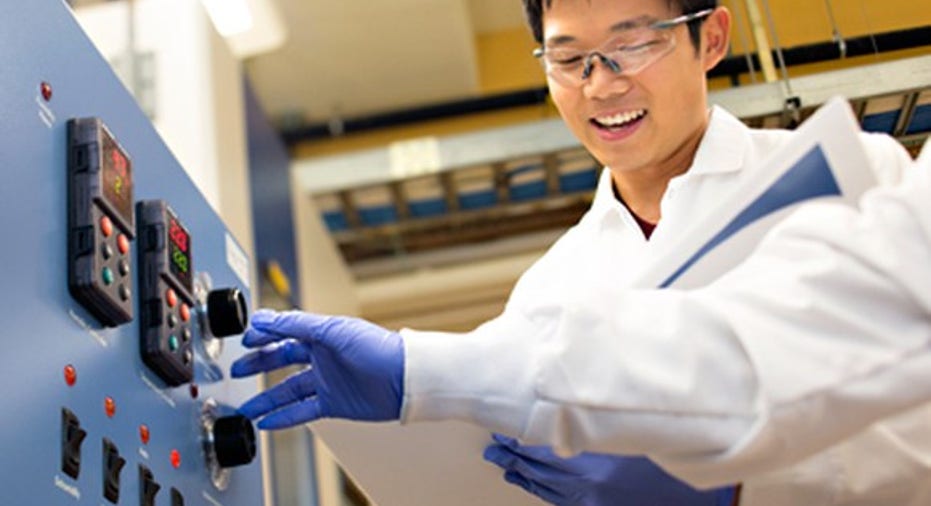Is This How Juno Therapeutics Gets Back on Track?

Juno Therapeutics (NASDAQ: JUNO) just released a wave of trial data on JCAR014 and JCAR017 that it hopes will reignite investor interest, following the recent and disappointing voluntary hold that management placed last month on its lead drug candidate, JCAR015. The data may offer up insight into what Juno Therapeutics' strategy may be if JCAR015 gets permanently shuttered, so let's take a closer look.
IMAGE SOURCE: JUNO THERAPEUTICS.
First, some background
JCAR015 was being studied in the company's ROCKET trial as a therapy for the treatment of relapsing or refractory acute lymphoblastic leukemia (ALL). This patient population has limited treatment options and a poor prognosis, so up until now it's been widely thought that a success in this mid-stage study could serve as the basis for an accelerated FDA approval.
Unfortunately, that may not longer be in the cards. In July, JCAR015's ALL trial was temporarily stopped after two patients died due to brain swelling. At the time, Juno Therapeutics concluded that the brain swelling wasn't due to JCAR015, but to the use of fludarabine as part of a chemotherapy preconditioning regimen. After Juno Therapeutics proposed discontinuing the use of fludarabine, the FDA agreed to restart the trial, but last month, the trial was stopped again after two more people died because of brain swelling.
JCAR015's trial halt is particularly discouraging to patients and doctors eager for new treatments to address this patient population. But it's also disappointing to investors, because it means Juno Therapeutics is no longer at the front of the pack in developing chimeric antigen receptor T-cell therapies (CAR-Ts). In CAR-T, a patient's T cells are removed and reengineered so that they can better identify cancer cells expressing specific surface proteins. Once a patient's T cells are reengineered, they're put back into the patient, where they can multiply and destroy cancer cells.
Other drugs progressing
JCAR015's trial halt has created a lot of uncertainty regarding Juno Therapeutics' path to commercialization, but new trial results for JCAR014 and JCAR017 suggest that Juno Therapeutics' first commercial CAR-Ts won't be used in ALL.
At this past week's American Society of Hematology conference, management presented data showing that JCAR014 helped patients with chronic lymphocytic leukemia (CLL) who have failed to respond, or seen their disease return, following treatment with Imbruvica -- a common CLL chemotherapy drug.
CLL patients participating in the trial had previously received a median five previous therapies, including Imbruvica, yet 88% of evaluable patients experienced a complete bone-marrow response (determined by flow cytometry), while 7 of 14 patients had no detectable disease. Further, all seven of those responders were alive and progression-free during the follow-up period, which ranged from three to 26 months.
Management also reported at the conference that JCAR017 is delivering intriguing efficacy in relapsed/refractory diffuse large B cell lymphoma (DLBCL). In 20 evaluable patients, the overall response rate to JCAR017 was 80%, and that included 12 patients who were complete responders.
Moving forward
The JCAR014 data did include concerning safety issues that are reminiscent of JCAR015. Specifically, 8% of patients in the study developed grade 3 to grade 5 cytokine-release syndrome, which can be life-threatening, and 25% of patients developed grade 3 to grade 5 neurotoxicity. One patient died, at least in part due to brain swelling.
Nevertheless, Juno Therapeutics plans to continue studying JCAR014 in combination with Imbruvica in CLL patients, and a trial is slated to begin next year. JCAR014's results may support the initiation of a study of JCAR017 in CLL, too.
JCAR017 has the same cell-surface target as JCAR014, but it may have a better safety profile.
In JCAR017's DLBCL study, there were no grade 3 or higher cases of cytokine-release syndrome, and only 14% of patients experienced grade 3 or 4 neurotoxicity. Management expects to launch a pivotal DLBCL study next year.
Overall, Juno Therapeutics' JCAR015 troubles are worrisome, but the JCAR014 and JCAR017 data show that this company is far from a one-trick pony. The company boasts one of the best balance sheets in clinical-stage drug development, with $1 billion in cash, and even though its cash burn is tracking at $60 million per quarter, that stockpile suggests there's plenty of financial flexibility to develop its other CAR-Ts.
Nevertheless, there's a lot of risk and uncertainty associated with Juno Therapeutics' CAR-T program right now, and in my view, its shares may be a much riskier bet than the shares of peers that are also developing CAR-Ts.
10 stocks we like better than Juno Therapeutics When investing geniuses David and Tom Gardner have a stock tip, it can pay to listen. After all, the newsletter they have run for over a decade, Motley Fool Stock Advisor, has tripled the market.*
David and Tom just revealed what they believe are the 10 best stocks for investors to buy right now... and Juno Therapeutics wasn't one of them! That's right -- they think these 10 stocks are even better buys.
Click here to learn about these picks!
*Stock Advisor returns as of Nov. 7, 2016
Todd Campbell has no position in any stocks mentioned.Todd owns E.B. Capital Markets, LLC. E.B. Capital's clients may have positions in the companies mentioned.Like this article? Follow him onTwitter where he goes by the handle@ebcapitalto see more articles like this.
The Motley Fool recommends Juno Therapeutics. Try any of our Foolish newsletter services free for 30 days. We Fools may not all hold the same opinions, but we all believe that considering a diverse range of insights makes us better investors. The Motley Fool has a disclosure policy.



















